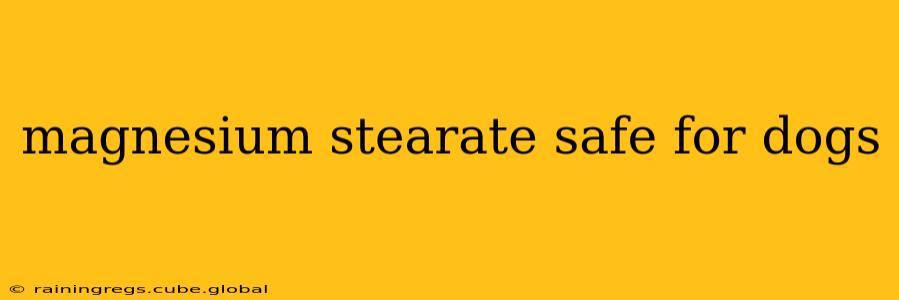Magnesium stearate is a common ingredient in many pharmaceutical and dietary supplement products, often used as a flow agent to prevent ingredients from sticking together. This raises a common concern amongst pet owners: is magnesium stearate safe for dogs? The short answer is complex, and depends heavily on several factors. While generally considered non-toxic in small quantities, there are nuances to consider. This article will delve into the safety of magnesium stearate for canines, addressing frequently asked questions and providing a balanced perspective.
What is Magnesium Stearate?
Magnesium stearate is a salt formed from magnesium and stearic acid, a saturated fatty acid. Its primary role in manufacturing is as a lubricant and flow agent. This means it helps prevent powders from clumping, making it easier to process and handle in capsules or tablets. It's also sometimes used as a release agent to help products separate from molds during manufacturing.
Is Magnesium Stearate Toxic to Dogs?
The toxicity of magnesium stearate in dogs is generally considered low. The substance itself isn't inherently harmful. However, the concern arises from potential exposure and quantity. Ingestion of large quantities could lead to mild gastrointestinal upset, such as diarrhea or vomiting. It's crucial to understand that "large quantities" is relative to the dog's size. A small amount ingested accidentally from a spilled supplement is unlikely to cause significant harm.
What Happens if My Dog Eats Magnesium Stearate?
If your dog ingests a small amount of magnesium stearate, they may experience no symptoms at all. In cases of larger ingestion, you might observe mild gastrointestinal distress. This could include vomiting, diarrhea, or loss of appetite. If you suspect your dog has ingested a significant amount, or if they exhibit severe symptoms, contact your veterinarian immediately.
Can Magnesium Stearate Cause Allergies in Dogs?
While rare, some dogs may exhibit an allergic reaction to magnesium stearate. This is more likely to occur with repeated or prolonged exposure, not from a single, accidental ingestion. Allergic reactions can manifest in various ways, including skin irritation, itching, hives, or respiratory distress. If you notice any unusual symptoms after your dog has been exposed to magnesium stearate, consult your veterinarian.
Magnesium Stearate in Dog Supplements and Medications
Many dog supplements and medications contain magnesium stearate. The amount present in these products is usually very small and is not considered a cause for concern. However, always read the labels carefully and choose high-quality products from reputable manufacturers. If you have concerns about specific ingredients in your dog's medication or supplements, discuss them with your veterinarian.
How to Prevent My Dog from Ingesting Magnesium Stearate
The best way to prevent your dog from ingesting magnesium stearate is to keep all medications and supplements out of their reach. Store them securely in cabinets or containers that your dog cannot access. If you spill a supplement containing magnesium stearate, clean up the spill thoroughly to avoid accidental ingestion.
Should I be Concerned About Magnesium Stearate in My Dog's Food?
Magnesium stearate is not typically found in commercial dog food. Its inclusion is extremely rare and unlikely. The focus should remain on ensuring the food is high quality and meets your dog's nutritional needs.
Conclusion
In conclusion, while magnesium stearate is generally considered safe for dogs in small quantities, it's essential to practice caution and responsible pet ownership. Keep all medications and supplements out of reach, and contact your veterinarian immediately if you suspect your dog has ingested a significant amount or is showing any signs of distress. As with any potential pet health concern, always consult with a veterinary professional for personalized advice based on your dog's specific circumstances.
